Tag: FIN Advocate
University Student Ehler Win Steps Into New FIN Leadership Role
The new year is bringing a bittersweet transition to FIN's steering committee. Gladis Clemente, a Community Food Advocate of more than three years and our most recent steering committee co-chair, is stepping back from her formal roles with FIN. Gladis has been an enthusiastic leader and vocal advocate, and we're thankful for all of her contributions to our community. Gladis will continue to be a member of the FIN family, and we look forward to seeing much more of her.
We are excited that this transition will create an opportunity for Community Food Advocate Ehler Win to step into the steering committee co-chair position, and we'd like to share some words from both of these wonderful leaders.
From Gladis:
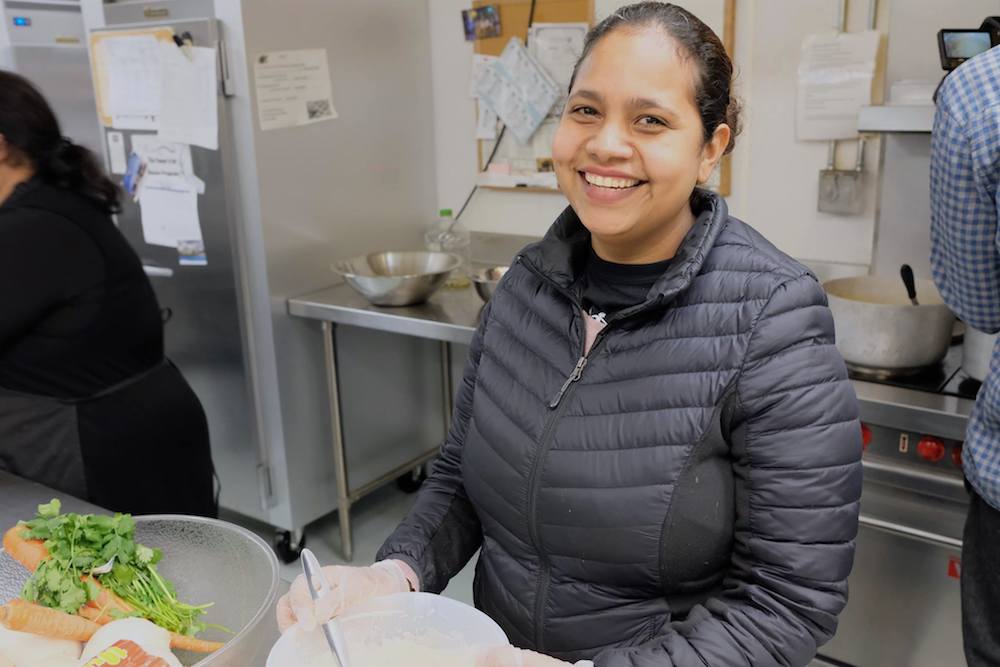
I can share my experience as a community advocate, developing leadership and advocacy skills for more than three years. Thanks to the skills I gained during different workshops, I have been able to submit public comments at city hall, and participate more actively in community groups such as PTA and coalitions.
I would like to emphasize the impact of FIN, with its collective and innovative model. As community members, we are not used to participating in the decision-making process. But FIN's approach is unique and different: the steering committee is formed by organizations, educational institutions, and local government— and community members, as well. We feel that our voice is heard, and we are important and valuable. Coming from underserved and marginalized communities, we, as advocates have the opportunity to support system and policy change in order to end the poverty cycle in our communities. I couldn’t be more proud to be part of such an amazing organization.
I want to express my gratitude for all the support FIN provided for more than three years. I definitely wouldn’t be the same person that I am now without FIN. I welcome Ehler as a new co-chair—she is very capable, and I know she is going to be excellent in this role.
From Ehler:
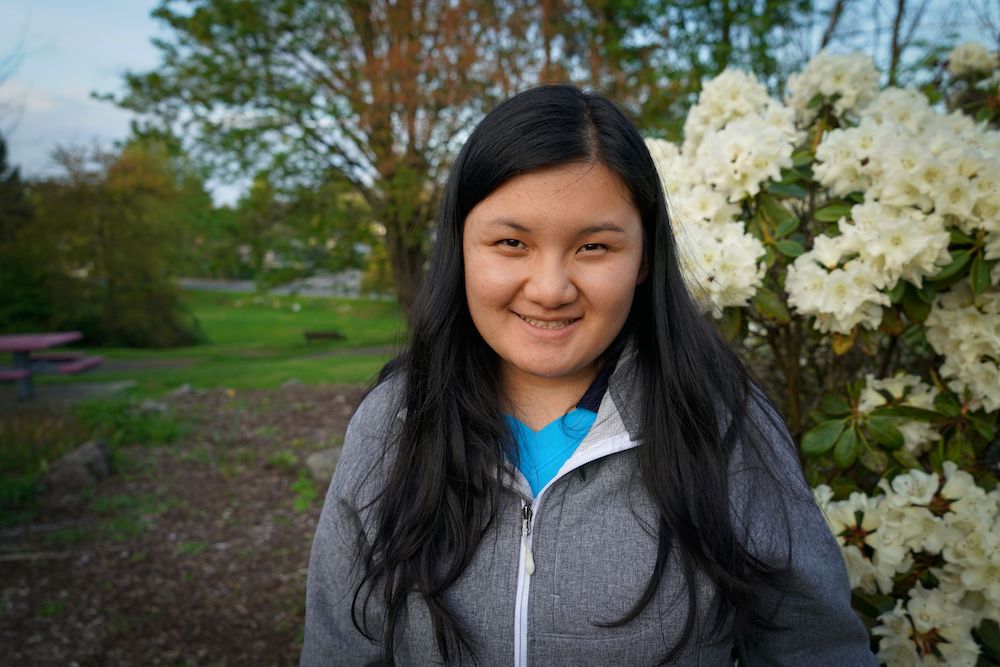
I am currently a senior at UW. I've been an advocate for a little over a year and have learned and grown so much within this community. I am really excited and humbled to have been chosen as the next co-chair for the steering committee, and am really looking forward to the ways I will grow and contribute to this committee. This community means so much to me and we have many exciting things coming up ahead, especially the Tukwila Village Food Hall. I'm so excited to be one of the many, many people working behind this project.
“A Wonderful Time” at Community Kitchen Night
Last week, dozens of community members joined us to share food and stories at Community Kitchen Night, a quarterly event we co-present with the City of SeaTac. This time, we took the celebration outdoors for a barbecue at North SeaTac Park.
[caption id="attachment_2492" align="alignright" width="300"]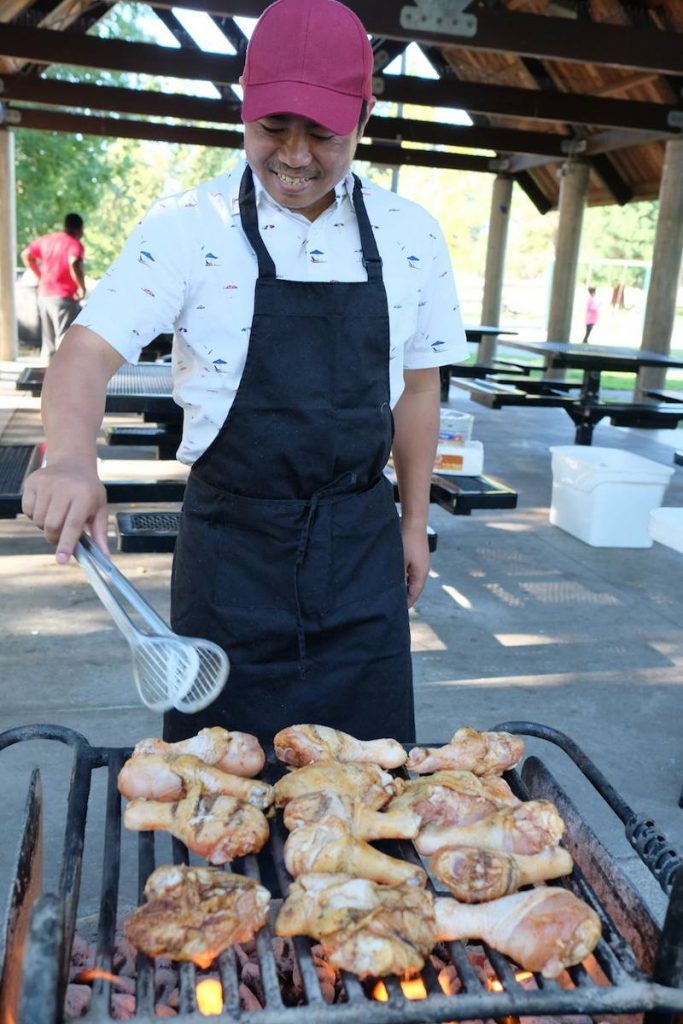 Nga Reh made delicious chicken at Community Kitchen Night.[/caption]
Here's what Community Food Advocate Nga Reh said about the evening:
Nga Reh made delicious chicken at Community Kitchen Night.[/caption]
Here's what Community Food Advocate Nga Reh said about the evening:
"I had such a wonderful time. It was a great idea to make it an outdoor activity, and I liked the way we shared foods from each of our communities. This was my first time serving food. At first, I was afraid that the people wouldn't like the foods I served. I'm glad that they did! And it was great that anyone could join. If I have another chance, I will participate again!"Thanks to everyone who came out for this great gathering! Check out more pictures on Facebook. Then mark your calendars for our next Community Kitchen Night, which will be at SeaTac Community Center on Sept. 26.
Conference Reflections – Equity in Organizations
At the end of last year, we sent several advocates to the Community Food Systems Conference. Here's what they learned...
My general perception is that the conference central topics were farming and projects/programs related to farming. One of the workshops that I attended talked about doing partnerships with churches that have land to offer farming opportunities for low-income families. I am convinced that FIN has to be innovative in building new partnerships.
I noticed that most of the non-profits had white board members but serve immigrant and refugee communities. I like that FIN is inclusive and gives the opportunity to advocates to be part of the steering committee and being part of the voices that make decisions. However, we do need to have more visibility in the community. I think that seeing from others and learning from other organizations around will give us the opportunity to improve FIN work. I am proud about FIN diversity in the steering committee and community/partners - our mission and vision are led by the people that we serve. I like that we are listened to as FIN Advocates. The advocates are the most authentic members of FIN, they are the connection with the community and their needs.
-Jaqueline Garcia, FIN Advocate
Conference Reflections – Social Justice & Farming
At the end of last year, we sent several advocates to the Community Food Systems Conference. Here's what they learned...
The conferences were informative. The conference was packed full of topics, like food, community and organizational involvement, healthy eating, nutrition, social justice, gardening, and farming. It promoted public markets and encouraged better use of SNAP benefits. I was particularly inspired by the food justice workshops that were lead by Native Americans. They focused on teaching children the importance of farming, gardening, land, nature, and spirit. There is a focus on where food comes from and they want children to understand and appreciate the idea of farming and gardening. My takeaway for FIN is the importance of working with children. We should invite or visit schools to promote healthy eating, farming, and gardening. I believe it’s important for children to know the source of food they eat every day. -Zozan Shamdeen, FIN AdvocateConference Reflections – Farm to School
At the end of last year, we sent several advocates to the Community Food Systems Conference. Here's what they learned...
I learned about movement-building in food systems: the case of Puerto Rico, how people have the ability to sustain themselves, besides early colonial context, production, focused on exportation. Most of their produce comes from outside of the island. They are building a network collectively with people who want to work the land and have little or none knowledge of farming. Children start to learn about farming since first grade through third grade, they are bringing agricultural back and they are applying to math and science concepts. They are trying to influence in Public policy, GMO and pesticide regulation. I also enjoyed Winona LaDuke talk. She mentioned that abundance is the nature of life and discussed how to make America great again in the food access context. We need to farm something to feed our soul. We are interested in feeding the next generation of our people, this is where we will restore the food system. More consumers are seeking farm-fresh food and more farmers,-especially small- and mid-size operations are profiting from these new markers. I learned that every year the USDA awards up to $5 million in grants to help schools connect with local producers and teach children where their food comes from.As a FIN member, I think we can look for partnerships in schools to provide farming support to the children. Favorite Quote: “A country that doesn’t produce what it eats is not free” Jesus Vazquez Thanks FIN for such a great learning experience! -Gladis Clemente, FIN AdvocateGladis Clemente – Advocate Profile
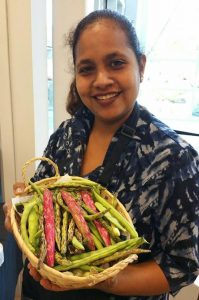 Civic advocacy is in her blood.
Gladis grew up in a small town outside of Acapulco in Mexico where her father was elected mayor not just once but three times. Politicians have a reputation for being rich and out of touch with their constituents in Mexico. Contrary to this, her parents came from a humble lifestyle and always stayed close to their community. Gladis remembers her parents explaining that she would attend public school because education is the most powerful way to change the world. Now, Gladis carries the lessons from her parents into her work with in the US.
Gladis joined FIN in 2016 as an advocate because she wanted to work on closing the opportunity gap in South King County communities. Although being a FIN advocate was her first paid job in the US, Gladis has worked hard as a mother, volunteer, and advocate for education reform. Even in the last year, she has been organizing, speaking up, and making connections like crazy. In March of 2017, Gladis participated in a FIN Government 101 training where she connected with Washington CAN, a local advocacy group. She’s since partnered with them to advocate for education reform like universal pre-school, increased funding for dual language programs, and support for immigrant parents.Meanwhile, she’s also become known in the FIN office as the go-to person for budgeting after she volunteered to learn about budgeting for the advocate program.
Civic advocacy is in her blood.
Gladis grew up in a small town outside of Acapulco in Mexico where her father was elected mayor not just once but three times. Politicians have a reputation for being rich and out of touch with their constituents in Mexico. Contrary to this, her parents came from a humble lifestyle and always stayed close to their community. Gladis remembers her parents explaining that she would attend public school because education is the most powerful way to change the world. Now, Gladis carries the lessons from her parents into her work with in the US.
Gladis joined FIN in 2016 as an advocate because she wanted to work on closing the opportunity gap in South King County communities. Although being a FIN advocate was her first paid job in the US, Gladis has worked hard as a mother, volunteer, and advocate for education reform. Even in the last year, she has been organizing, speaking up, and making connections like crazy. In March of 2017, Gladis participated in a FIN Government 101 training where she connected with Washington CAN, a local advocacy group. She’s since partnered with them to advocate for education reform like universal pre-school, increased funding for dual language programs, and support for immigrant parents.Meanwhile, she’s also become known in the FIN office as the go-to person for budgeting after she volunteered to learn about budgeting for the advocate program.
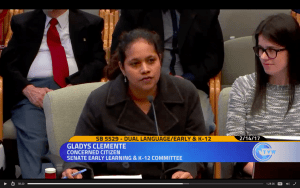
“We must educate people to change the system. Get them to see reality is on both sides....We must prioritize civic engagement.”
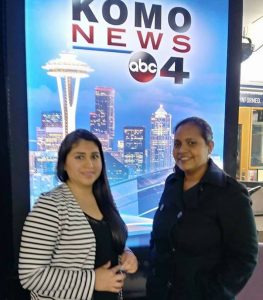 There are many issues she advocates for but ultimately, Gladis says the most important thing to get others to speak up as well. Over the last year, she has gained confidence and overcome her own barriers of public speaking in a mixed community. She thinks back to the first time she spoke in front of lawmakers in Olympia and knows how intimidating it feels. She believes that if more people speak up, lawmakers will listen – but the challenge is in getting people to talk. This is part of what makes Gladis such an effective community advocate, she sees the value in both helping people and working to change the system at the same time.
There are many issues she advocates for but ultimately, Gladis says the most important thing to get others to speak up as well. Over the last year, she has gained confidence and overcome her own barriers of public speaking in a mixed community. She thinks back to the first time she spoke in front of lawmakers in Olympia and knows how intimidating it feels. She believes that if more people speak up, lawmakers will listen – but the challenge is in getting people to talk. This is part of what makes Gladis such an effective community advocate, she sees the value in both helping people and working to change the system at the same time.
Gladis wants people to know that it’s possible for people to create their own opportunities. The only way to make a difference is to walk through a door and become involved – ask questions and volunteer to help out. Anyone can make a difference in a community.
Madeleine Kabena – Advocate Profile
Two days after arriving in the US, Madeleine Kabena found herself in an emergency room with her five-year-old daughter, Aline. Despite how it sounds, this was exactly why Madeleine and her family applied for the Diversity Visa lottery that allowed them to immigrate. They came here to find treatment for Aline, who was born with a genetic disorder. Although her health problem doesn’t have a cure, regular treatments can vastly improve both symptoms and outlook. At home in the Congo, treatment was limited and the threat of malaria loomed daily.
[caption id="attachment_1737" align="alignright" width="225"]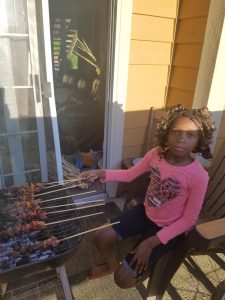 Madeleine's daughter[/caption]
While Madeleine brought her family here so her daughter could have a better life, it hasn’t all been easy. At first, it was a high to be in the United States but then reality began to sink in. There were the usual things, like learning a new language, but also some deeper issues. Food at the hospital was not good and she wasn’t finding traditional foods in her neighborhood. In the Congo, there are more than 200 cultures and what connects them all is the belief in good food. It is even thought that some disease can be healed through a healthy and nourishing diet. In fact, this is what Madeleine believes allowed her daughter to survive so long without regular treatments.
Madeleine's daughter[/caption]
While Madeleine brought her family here so her daughter could have a better life, it hasn’t all been easy. At first, it was a high to be in the United States but then reality began to sink in. There were the usual things, like learning a new language, but also some deeper issues. Food at the hospital was not good and she wasn’t finding traditional foods in her neighborhood. In the Congo, there are more than 200 cultures and what connects them all is the belief in good food. It is even thought that some disease can be healed through a healthy and nourishing diet. In fact, this is what Madeleine believes allowed her daughter to survive so long without regular treatments.
[caption id="attachment_1744" align="alignleft" width="169"]“Luckily I found that Chinese and Hispanic produce is very similar to Congolese. I shop there for vegetables like cassava, okra, and greens.”
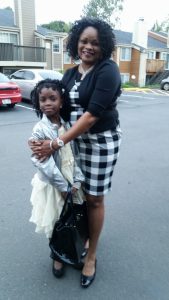 Madeleine with her daughter[/caption]
By searching for culturally appropriate foods, Madeleine discovered a distinct lack of Congolese shops, restaurants, or even organizations in King County. In all her asking around for connections to food, she eventually met a Congolese man who called himself a ‘Community Food Advocate.’ Madeleine was intrigued and hopeful. Over the first few years in the US, she worked as a caregiver at Wesley Homes. Her first profession was as a lawyer but her degree didn’t permit her to practice in the US. Becoming an advocate with FIN allowed her to represent people again while also building food connections for her community.
Madeleine with her daughter[/caption]
By searching for culturally appropriate foods, Madeleine discovered a distinct lack of Congolese shops, restaurants, or even organizations in King County. In all her asking around for connections to food, she eventually met a Congolese man who called himself a ‘Community Food Advocate.’ Madeleine was intrigued and hopeful. Over the first few years in the US, she worked as a caregiver at Wesley Homes. Her first profession was as a lawyer but her degree didn’t permit her to practice in the US. Becoming an advocate with FIN allowed her to represent people again while also building food connections for her community.
Madeleine’s hopes for the Congolese community in King County are the same as her hopes for her own family. In her own words... “I want people to have the best chance at life. And for us, that starts with things like healthcare and jobs but always ends with food and family.”“Unlike what I see in the Latino and Somali communities, the Congolese community here is small and very spread out. We sometimes struggle to connect with each other.”
South King County BDT’s-Outreach
SeaTac Course in English 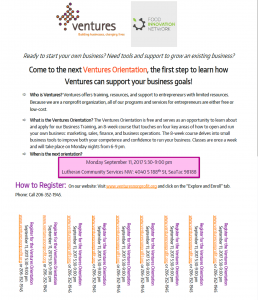 English: Calling all entrepreneurs and aspiring entrepreneurs in South King County! Do you have a business idea you’d like to pursue, or an existing business you’d like to grow? Register for the Ventures Orientation in SeaTac on Monday, September 11! Ventures and the Food Innovation Network are partnering to offer the first-ever business training in SeaTac. You’ll get an opportunity to learn about our program for small business owners with limited resources and apply for our 8-week Business Development Training course. The orientation is free and will be at Lutheran Community Services NW in SeaTac: 4040 S 188th St., SeaTac, 98188. Registration is required to attend, so click here to register now or call 206-352-1945 to register via phone or for more information.
English: Calling all entrepreneurs and aspiring entrepreneurs in South King County! Do you have a business idea you’d like to pursue, or an existing business you’d like to grow? Register for the Ventures Orientation in SeaTac on Monday, September 11! Ventures and the Food Innovation Network are partnering to offer the first-ever business training in SeaTac. You’ll get an opportunity to learn about our program for small business owners with limited resources and apply for our 8-week Business Development Training course. The orientation is free and will be at Lutheran Community Services NW in SeaTac: 4040 S 188th St., SeaTac, 98188. Registration is required to attend, so click here to register now or call 206-352-1945 to register via phone or for more information.
Healthy Kids Day
Last Saturday, FIN advocates, along with other partners, attended the YMCA's Healthy Kids Day and hosted a cooking station to demonstrate to kids and parents how fun and easy it is to eat healthy food. Here's what Gladis had to say about the experience: "It was a great experience for me to participate in the Healthy kids event at Matt Griffin YMCA. It was the first time that I have the opportunity to teach hands on how to make guacamole, which is a food that represents my culture and it is also a healthy dip made from vegetables.I really enjoy knowing that a healthy recipe can make a difference in somebody's life, especially with children and since this event was family friendly, many families could taste and learn from scratch how to make this food.I am very thankful to FIN for give me the chance to connect with the community through food." - Gladis Clemente [gallery ids="1449,1450,1451,1452,1453" orderby="rand"]
Zozan Shamdeen – Advocate Profile
One thing Zozan’s family has taught her is not to be afraid. But as a refugee, she hasn’t always been able to freely go after her dreams – even after making it to the US. Her family came this country as refugees from Iraq when Zozan was in middle school. By high school she dreamed about becoming a pediatrician and was on track to receive her green card and enter college.
[caption id="attachment_1430" align="alignright" width="300"]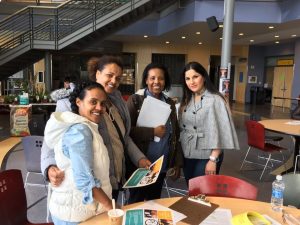 Zozan with fellow advocates.[/caption]
A clerical error over a date in her documentation caused all of that to be put on hold. She spent the next five years in legal limbo – all documentation had been revoked. And while her siblings all received citizenship, she was working with an immigration lawyer. Deportation loomed as an ever-present threat. Immigration officials told her not to worry, that in the event of deportation she would receive $200 and a plane ticket to Baghdad. As if a small amount of cash and a plane ticket to an unfamiliar city felt reassuring.
In the end, she was approved for a green card with the condition that she would never visit the middle east. During this process, Zozan learned the power of helping people gain a voice. Just hearing other people’s stories and volunteering allowed her to forget her own problems for a short time. She found herself providing language support to newcomers and soon after became a medical interpreter.
[caption id="attachment_1441" align="alignleft" width="300"]
Zozan with fellow advocates.[/caption]
A clerical error over a date in her documentation caused all of that to be put on hold. She spent the next five years in legal limbo – all documentation had been revoked. And while her siblings all received citizenship, she was working with an immigration lawyer. Deportation loomed as an ever-present threat. Immigration officials told her not to worry, that in the event of deportation she would receive $200 and a plane ticket to Baghdad. As if a small amount of cash and a plane ticket to an unfamiliar city felt reassuring.
In the end, she was approved for a green card with the condition that she would never visit the middle east. During this process, Zozan learned the power of helping people gain a voice. Just hearing other people’s stories and volunteering allowed her to forget her own problems for a short time. She found herself providing language support to newcomers and soon after became a medical interpreter.
[caption id="attachment_1441" align="alignleft" width="300"]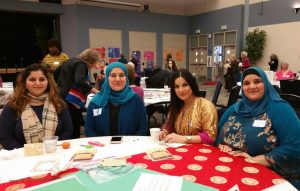 Zozan with her sisters.[/caption]
While she still thinks about going back to school, her dreams now are a little different that they were in high school. Instead of children, she is now more focused on supports for refugee parents. Kids learn faster than their parents and are the focus of a lot of support already. Zozan believes parents need a lot of extra support in cultural and language barriers. For now, she does this through medical interpreting and as an assistant teacher in the ESL department at Highline College. “If someone needs help and I can do it, I will be there. If I can’t do it, I will try.”
In her spare time, Zozan runs a catering company with her sister and advocates for food system change in South King County. Becoming a FIN Food Advocate was a natural fit because she is passionate about helping people see their options and keep moving toward the future. She and her sister have also received training and help in their business through FIN. “You get and you give,” she says, “it’s a circle that way.” She asks us all to be open to possibility, if you don’t try new things and ask for help you will never get what you want.
Zozan with her sisters.[/caption]
While she still thinks about going back to school, her dreams now are a little different that they were in high school. Instead of children, she is now more focused on supports for refugee parents. Kids learn faster than their parents and are the focus of a lot of support already. Zozan believes parents need a lot of extra support in cultural and language barriers. For now, she does this through medical interpreting and as an assistant teacher in the ESL department at Highline College. “If someone needs help and I can do it, I will be there. If I can’t do it, I will try.”
In her spare time, Zozan runs a catering company with her sister and advocates for food system change in South King County. Becoming a FIN Food Advocate was a natural fit because she is passionate about helping people see their options and keep moving toward the future. She and her sister have also received training and help in their business through FIN. “You get and you give,” she says, “it’s a circle that way.” She asks us all to be open to possibility, if you don’t try new things and ask for help you will never get what you want.
